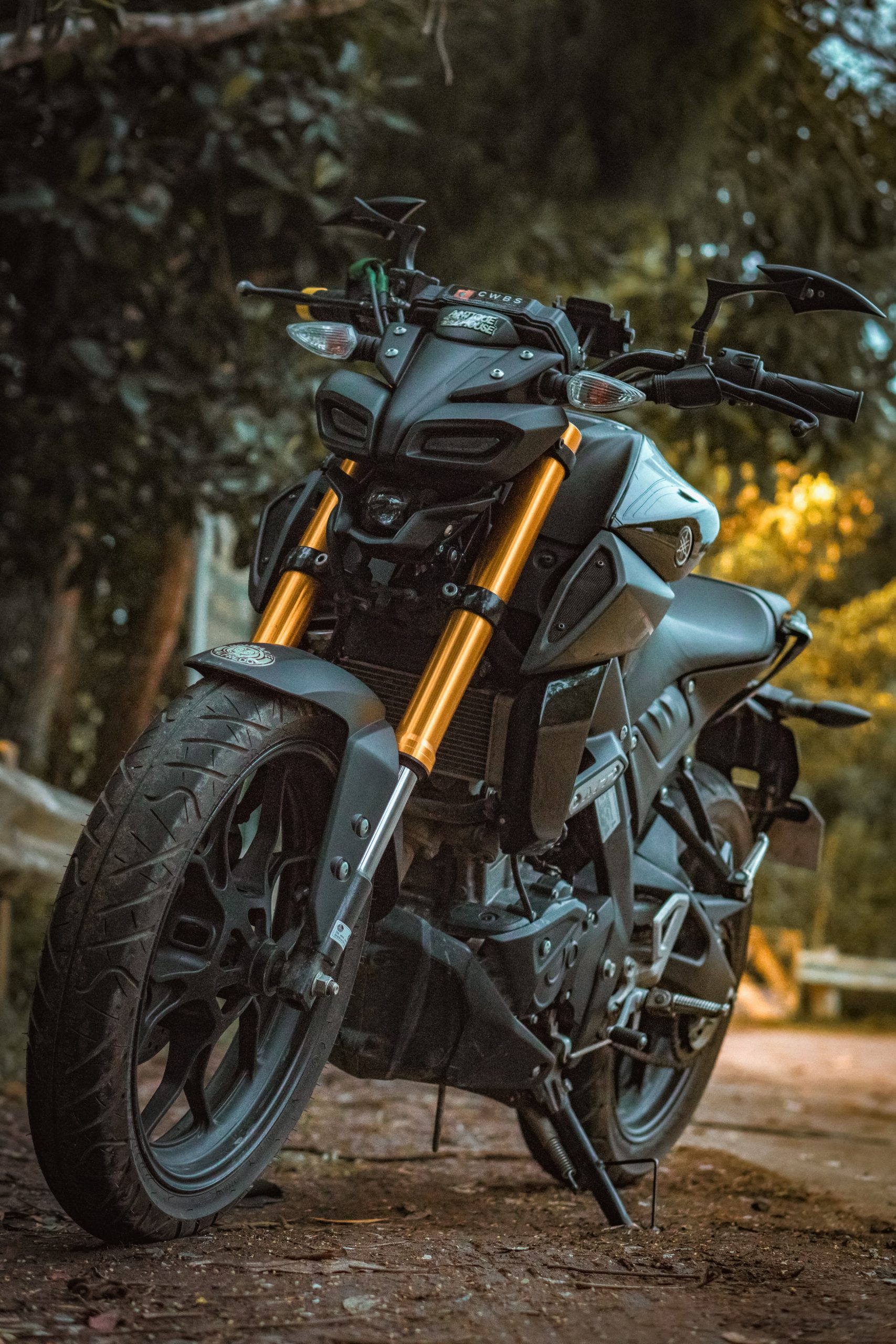BMW C EVOLUTION
The C Evolution is BMW’s first production electric scooter. After an international launch in 2014, it arrived in North America in mid-2017 as a California only model. It remains on sale as of 2020 for the hefty price of $13,995 – making it the most expensive scooter you can buy in North America.
Model Background
BMW produced a small batch of the C Evolution to show off in 2012, but didn’t start regular production until spring 2014. Since then, BMW has proudly displayed this model on their USA and Canadian websites but only as a concept. This scooter was never actually offered in North America until mid 2017. Even with it’s 2017 release, the C Evolution is only being sold California, but BMW is promising to increase the availability into other states at some point.
When it was first introduced the C Evolution had a smaller 8 kWh battery, but in 2016 BMW added the option of a “long range” 12.5 kWh pack which enabled a range of 99 miles (vs. 60 miles). Both packs are available overseas, but only the long range pack is offered in North America.
Power and Battery
The C Evolution makes 19kW of power, which translates to 48 horsepower. That’s less than BMW’s 650cc scooters, but still pretty solid. It’s similar to a typical 500 – 550cc scooter. Since the 53 lbs-ft of torque is immediately available from 0 RPM, the C Evolution zips off the line faster than any other scooter with a 0-30 mph time of 2.7 seconds, and 0-60 MPH in just 6.2 seconds. The top speed however is unfortunately lower than other big scooters, as BMW has limited the C Evolution to 80 mph. Some folks will find this disappointing, but with the current battery size it’s not like you could cruise faster for long anyways.
The lone battery pack offering in North America in a 12.5 kWh / 99 mile rated lithium ion. BMW has equipped this pack with air cooling, which is not great for longevity if you live in a hot climate. Liquid cooled packs control the temperature better to reduce degradation, although improving battery chemistry has reduced this difference. BMW is warrantying this pack for 5 years or 30,000 miles, although they don’t say how much capacity it’s warrantied to retain over this period.
Unfortunately, BMW hasn’t designed the C Evolution for DC fast charging. Thus the best it can do is an 80% charge in 3 hrs 50 min using 220 volt power (12A), which is 2.6 kW. A full charge takes another 40 minutes, while plugging to a regular 110 volt plug roughly doubles the charge time. Thus, you’re not going to want to wait around while the C Evolution charges, but if you have a plug in at work you could charge fast enough to have a full battery for the trip home.
Design
Despite naming similarities, the C Evolution shares little with BMW’s other C Series maxiscooters. It’s an entirely new platform, which was probably the only way to go when you see how hard it must have been to shoehorn that massive battery pack (above) into the frame.
Unsurprisingly, the C Evolution is a hefty machine with a total weight of 606 lbs. That’s about 50 lbs more than BMW’s other maxi’s, and just 3 lbs shy of the Burgman 650 for the title of the heaviest scooter on the market. With its low RPM torque you won’t feel the weight off the line, but will if you drop it. The battery pack provides quite a bit of that heft, and unfortunately it’s not positioned particularly low.
The C Evolution certainly looks like a futuristic machine, and this style extends to the dash where BMW has provided a digital display that looks the part and displays a wide variety of crucial information including charging rates and status when you’re plugged in.
Features and Amenities
The C Evolution comes pretty well equipped in terms of braking and suspension. It has 40mm inverted forks with a decent 4.7” of travel, and a single sided swingarm which squishes up to 4.5”. The C Evolution rides on 15” rims and stops using 270mm disc brakes (two rotors up front, one in the rear) with standard ABS. Also standard is traction control, which is certainly good because the 53 lbs-ft of torque would easily smoke the rear tire otherwise. This might be the first time that traction control in a scooter is actually needed.
BMW has provided several driving model options to you can tune in the power and regenerative braking to your preferences. We think “Dynamic” mode is the best (full power, full regen), but you can reduce the regenerative braking with “Road” mode (1/2 regen) or “Sail” mode (no regen). Lastly, there is “Eco Pro mode”, which sounds fancy but actually just limits the power while retaining full regen.
In terms of storage, the C Evolution is a bit disappointing because the bulky battery pack extends under the front of the seat. Only the rear half of the seat flips up, so this space can only accommodate a single helmet. Up in the legshield their appears to be two storage cubbies, but the left one is actually the charge port, so just the right one is there for storage. Still, it’ll be enough for most folks.
 Discussion
Discussion
For folks that do more commuting than road tripping, the C Evolution could be an excellent machine with it’s clean, quiet operation, low maintenance, cheap energy costs and quality construction. Unfortunately the current price ($13,995) makes the C Evolution tough to justify. That’s $3-$4g more than BMW’s other maxiscooters, and unlike those machines, you can’t take the C Evolution on a road trip unless you like waiting around at charging stations for extended periods by yourself. Indeed the C Evolution will save on fuel costs, but that $3-$4g gap will take a while to earn back. Assuming $0.10/kWh power and $2.50 gallon gas, the C Evolution requires about 90,000 miles to earn back that price tag premium via fuel savings.
It’s nice to see BMW developing the C Evolution, but they’ve got some work to do before it’s ready to go mainstream. Battery costs have plummeted in recent years to under $200/kWh, so a 12.5 kWh pack shouldn’t cost more than $2500 now and should be headed for $1000 in the next couple years. Considering that, and the money saved by avoiding a combustion engine and transmission, it would be nice to see the C Evolution priced much more similarly to BMW’s other maxis. BMW also really needs to enable DC fast charging. The C Evolution uses the same cells as BMW’s i3 car which can DC charge to 80% in 25 minutes, so there’s no reason the C Evolution can’t charge at the same rate. BMW seems to have skimped on the electronics here.
Overall, the C Evolution is a good looking design and it’s nice to see BMW bringing electric drive to the scooter world. It’s an interesting first generation machine, but hopefully they can increase the pack size and lower the price and charge times in the coming years. If they can do that, they’ll have a very interesting scooter. It won’t be long until electric scooters are the way to go.
Pros:
- Fast acceleration
- Clean, quiet operation
- Stylish
Cons:
- Max of 2.3kW charging
- Expensive
- Limited range
Links:
MotorscooterGuide Forums – Visit the forums on this site to chat about this scoot.
MCN Review – Nice write up of a week with the C Evolution
Key Specs:
- Engine: Liquid cooled permanent magnet synchronous motor
- Power: 48 HP @ 4650 RPM, 53.1 lbs-ft torque from 0 – 4650 RPM
- Transmission: Single speed
- Fuel Delivery: Electrons
- Wheelbase: 63.4”
- Weight: 606 lbs
- Seat height: 30.1”
- Battery Pack: 12.5 kWh
- Charging: 2.6 kW (220V) or 1.3 kW (110V).
- Range: 99 miles
- Front Brake: Dual 270mm rotor, 2 piston disc with ABS
- Rear Brake: Single 270mm rotor, 2 piston disc with ABS
- Front Suspension: Inverted 40mm fork with 4.7” travel
- Rear Suspension: Single Shock with 4.5” travel
- Tires: 120/70-15 (Front), 160/60-15 (Rear)
- USA MSRP: $13,995
- Colors: 2017-20: Electric Green/Ionic Silver


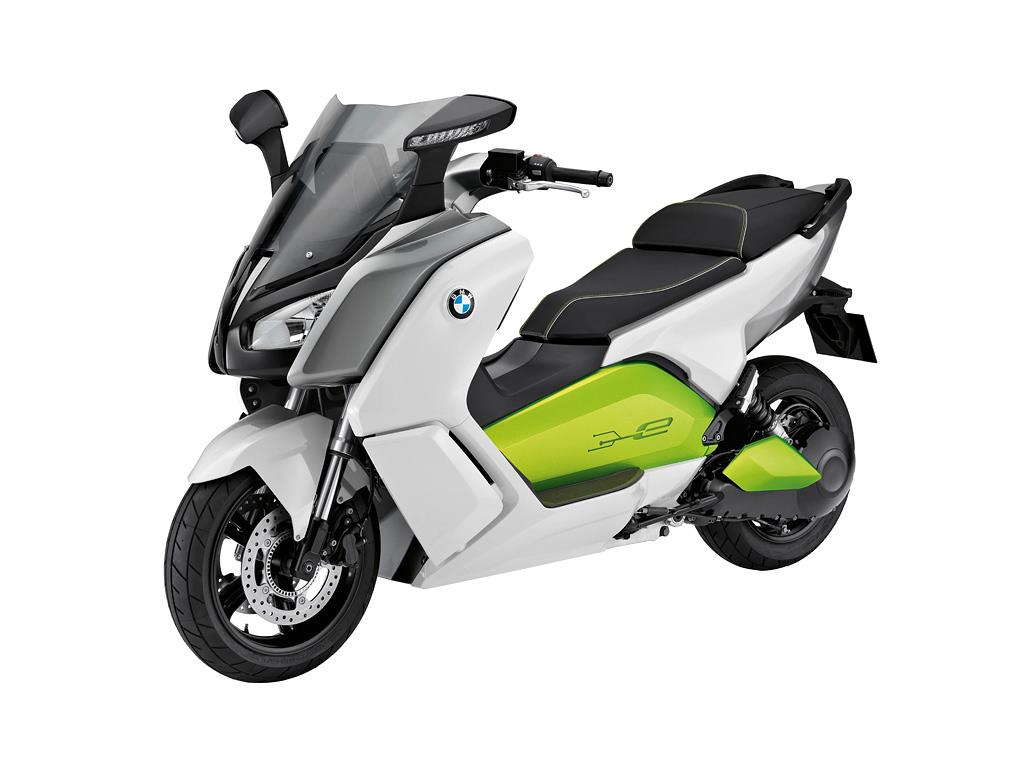
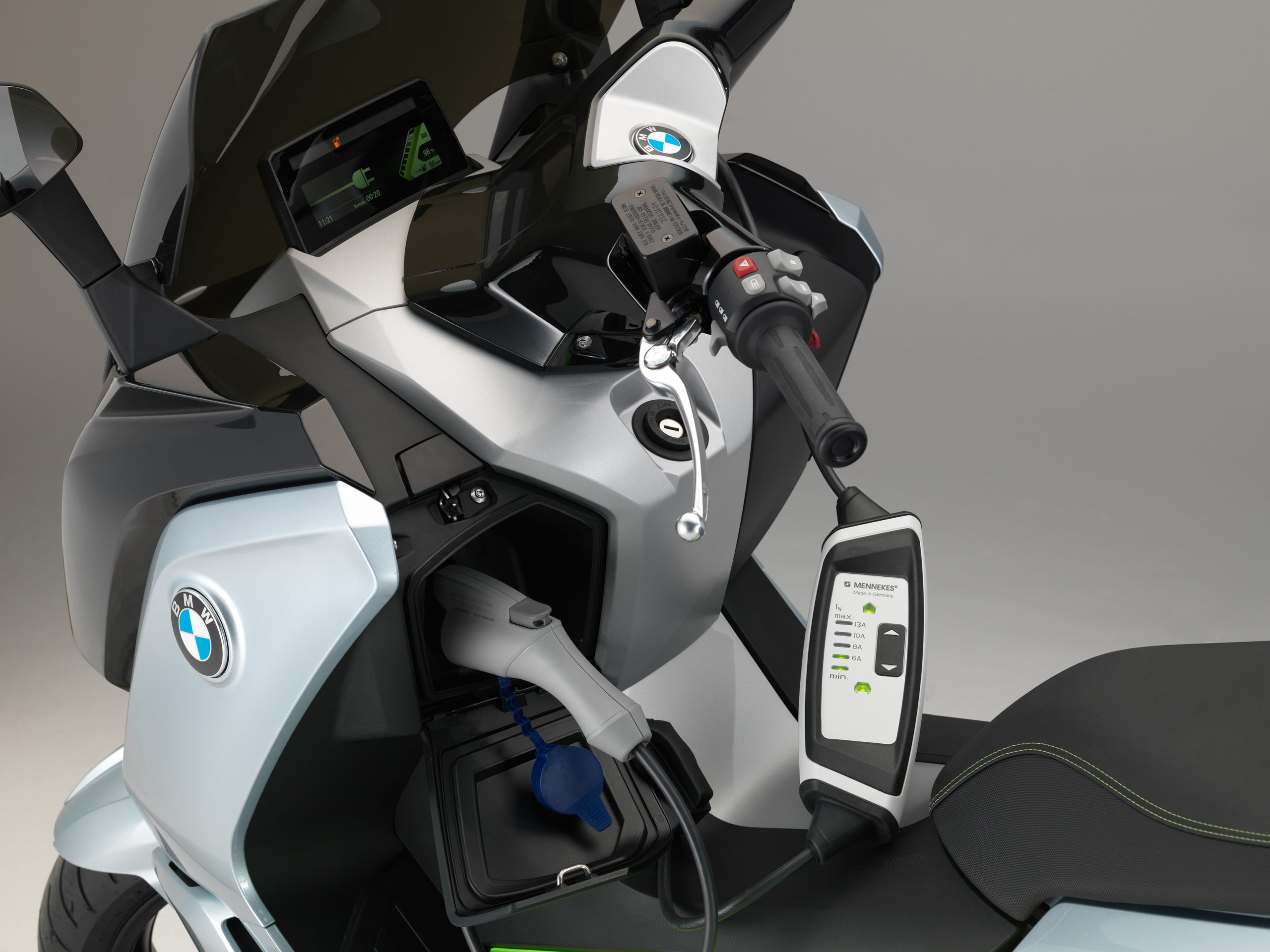
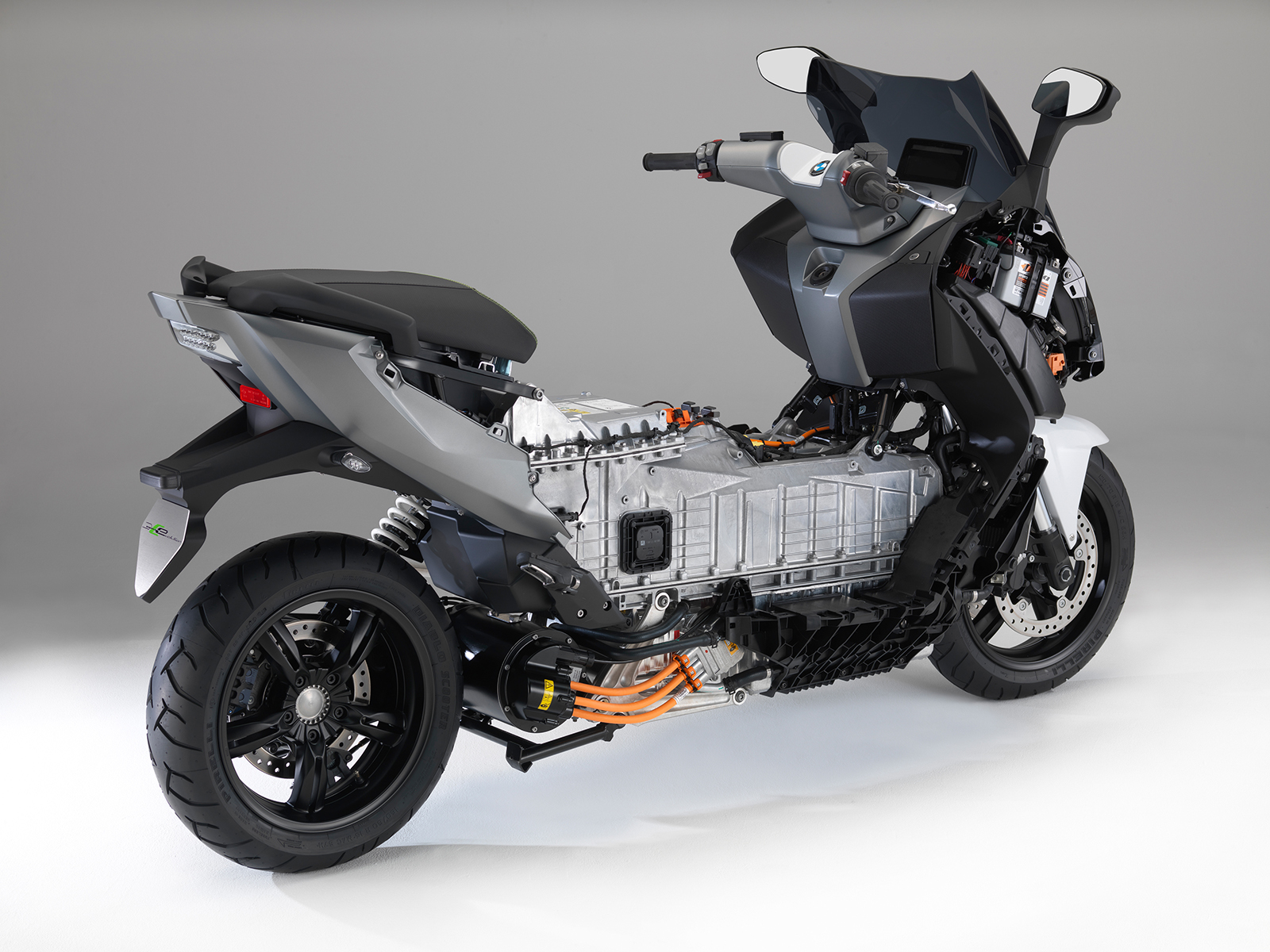
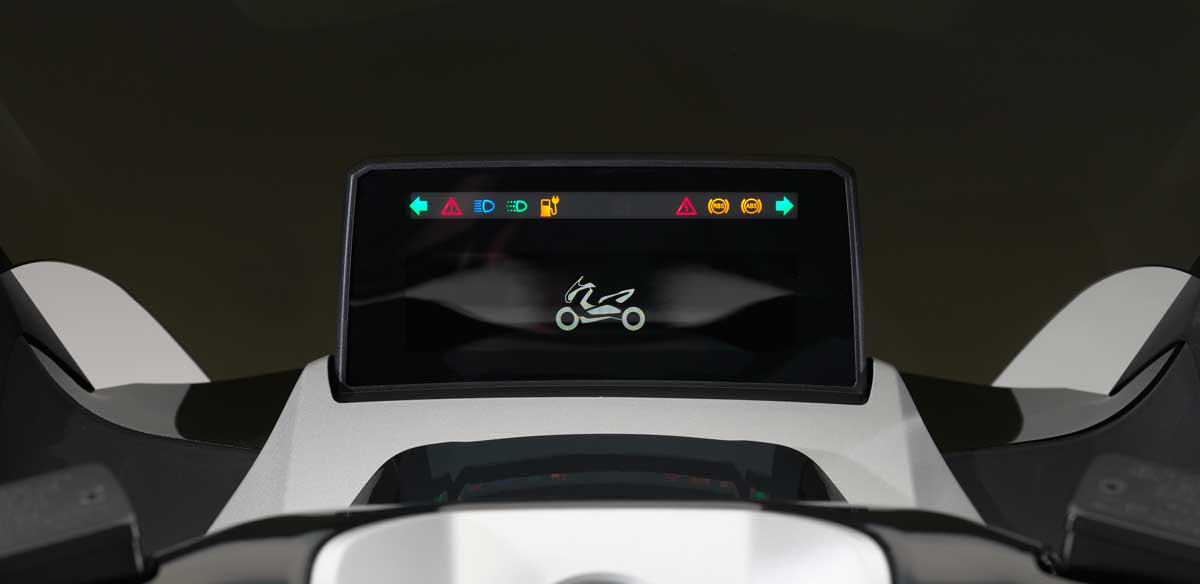
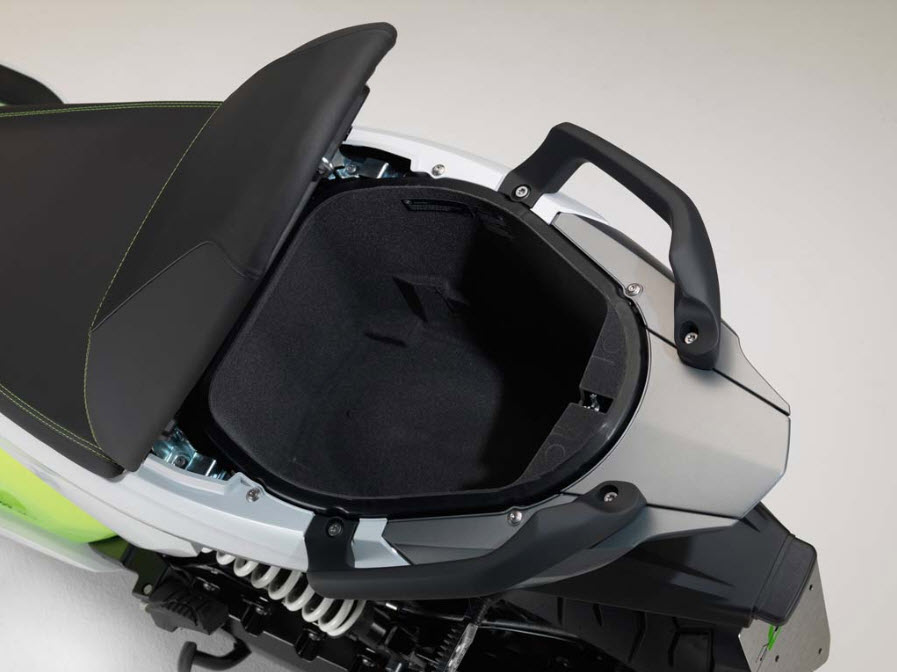
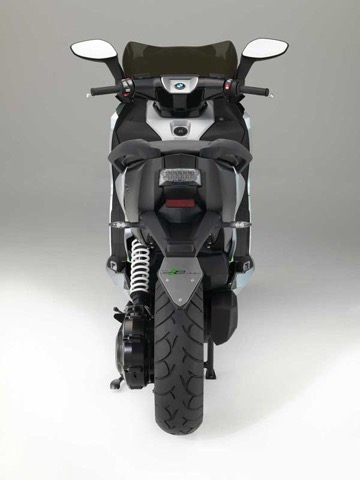 Discussion
Discussion